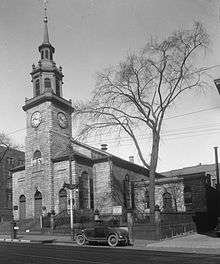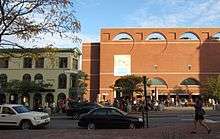Congress Street (Portland, Maine)
Congress Street is the main street in Portland, Maine. Congress stretches from Portland's southwestern border with Westbrook through a number of neighborhoods before ending overlooking the Eastern Promenade on Munjoy Hill. In March 2009, the Portland City Council designated much of the inner portion of Congress Street a historic district.[1][2]



History
When what is now Portland was founded by British colonialists in the early 18th century, the population settled primarily on the waterfront near what is now India St. Congress was laid out and originally known as Back Street and later Queen Street. The first prominent structures on the street were the First Parish Meeting House, built in 1740 and replaced to the present structure in the 1820s as well as the hay scales in Market Square, later known as Monument Square. From the early settlement of Portland until the American Revolutionary War period, Back Street was considered the far edge of the town. It took the name of Congress Street beginning in 1823.[3]
In 1921, the Etz Chaim Synagogue was built on the eastern end of Congress Street approaching Munjoy Hill. As of 2011, it was the only immigrant-era synagogue still functioning in Maine.
A study in 2011 sought to change a number of features on the street, including decreasing the number of stoplights and ending left hand turns off of the street. Greater Portland planners also called the street the most congested artery in the region.[4]
See also
- Munjoy Hill: Congress Street begins on the Eastern Promenade, located on Munjoy Hill
- Eastern Cemetery, bounded by Congress and Mountfort Street at the base of Munjoy Hill
- Lincoln Park, between Pearl, Federal Congress and Franklin Sts
- Press Herald Building, corner of Exchange and Congress Sts.
- North School, 248-264 Congress St
- Etz Chaim Synagogue, 267 Congress St
- St. Paul's Church and Rectory, 279 Congress St
- Cathedral of the Immaculate Conception, 307 Congress St
- First Baptist Church, 353 Congress St.
- Central Fire Station, 380 Congress St.
- First Parish Church, 425 Congress St.
- Monument Square (also home to the Portland Public Library and One City Center buildings)
- Lancaster Block, 474 Congress St.
- Time and Temperature Building, 477 Congress St.
- Maine Historical Society, 489 Congress St.
- Mechanics Hall, 519 Congress St.
- Porteous, Mitchell and Braun Company Building (home of the Maine College of Art), 522-528 Congress St.
- Asa Hanson Block, 548-550 Congress St.
- Salt Institute for Documentary Studies, 561 Congress St.
- State Theatre, 609 Congress St.
- Baxter Building, 619 Congress St.
- Maine Eye and Ear Infirmary, 794-800 Congress St.
- Fore River Sanctuary, outer Congress St.
- Portland Museum of Art, Congress Square at the intersection of Free and High Sts.
- Congress Square Park, a small park on the corner of High and Congress St.
- Henry Wadsworth Longfellow Monument, located in Longfellow Square at the intersection of Congress St., State St., and Pine St.
References
- Proposed Congress Street Historic District Archived 2011-07-21 at the Wayback Machine City of Portland, Maine
- Recommendation of the Historic Preservation Board Archived 2011-07-21 at the Wayback Machine February 2009
- "Archived copy" (PDF). Archived from the original (PDF) on 2011-07-21. Retrieved 2011-04-29.CS1 maint: archived copy as title (link) Congress Street Historic District-Designation Report
- Planner: Congress Street study not just for buses Portland Daily Sun, July 12, 2011
External links
- "A Soundwalk in Portland Maine", CoLab Radio, Listening to the City, Massachusetts Institute of Technology, May 26, 2015